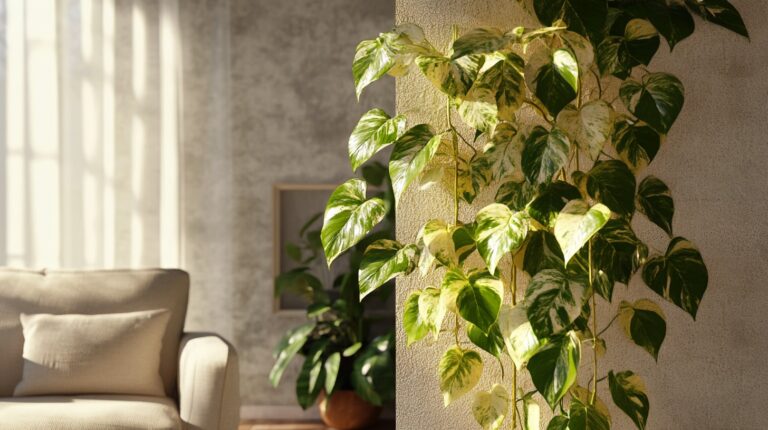Money plants have long been cherished for their ability to attract wealth, prosperity, and positive energy.
According to traditions like Feng Shui and Vastu Shastra, these plants not only enhance the beauty of a space but also invite good fortune.
Whether you’re looking to bring financial success, purify the air, or simply add a touch of greenery to your home or office, money plants offer numerous benefits.
To make your choice easier, let’s discuss types of money plants that can uplift your surroundings and bring in those good vibes.
1. Golden Pothos (Epipremnum Aureum)
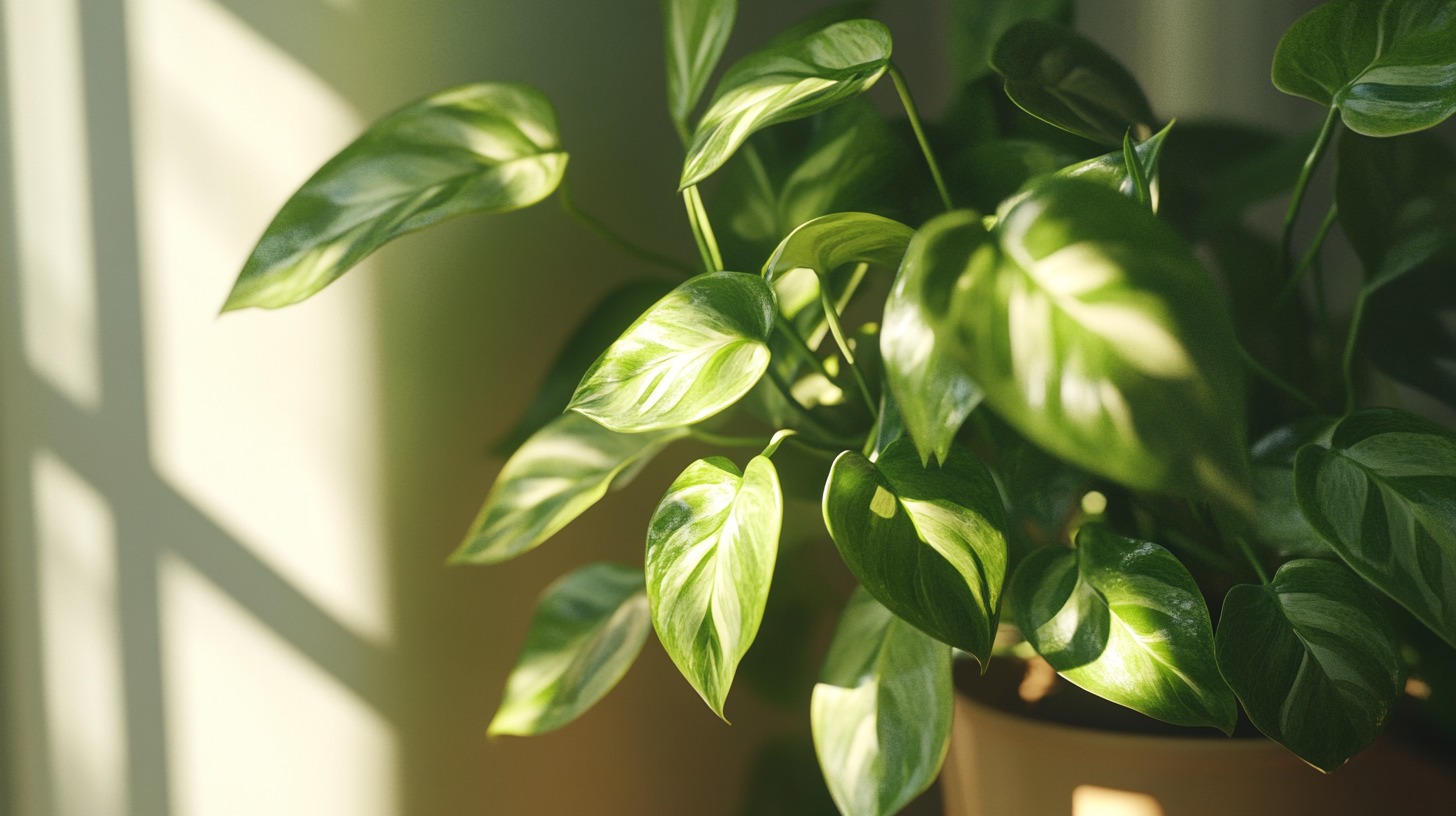
- Heart-shaped, green and golden variegated leaves
- Air-purifying qualities
- Tolerates low light and minimal watering
Golden Pothos stands out as one of the most popular and beloved money plants.
Its lush, trailing vines create a beautiful cascade, making it a perfect choice for hanging baskets, shelves, or as a statement piece on a tabletop.
This versatile plant is known not only for its beauty but also for its incredible resilience and adaptability.
The Golden Pothos thrives in a wide range of lighting conditions, effortlessly adjusting from bright, indirect light to low-light environments.
Even if you’re new to plant care, the Golden Pothos is forgiving of occasional neglect, including missed waterings or inconsistent light exposure, making it an ideal choice for beginners.
2. Jade Plant (Crassula Ovata)
- Coin-shaped, thick leaves
- Low-maintenance succulent
- Symbolizes wealth and longevity
The Jade Plant, or Crassula Ovata, attracts attention with its thick, glossy, coin-shaped leaves that symbolize wealth, prosperity, and good luck.
Many people associate its rounded leaves with abundance, resembling coins, which is why they choose it to invite financial blessings into their homes.
The Jade Plant is not only attractive but also incredibly resilient, with a reputation for being one of the easiest plants to grow indoors.
What makes the Jade Plant especially appealing to plant lovers is its slow growth rate and minimal care requirements.
It thrives in bright sunlight and well-draining soil, needing only occasional watering, which makes it perfect for those who don’t have much time to devote to plant care.
In fact, under the right conditions, the Jade Plant can live for decades, growing into a small, tree-like structure.
It’s not uncommon for these plants to be passed down from one generation to the next, serving as a living heirloom filled with positive energy.
3. Money Tree (Pachira Aquatica)

- Braided trunk with glossy, green leaves
- Brings good luck and prosperity
- Thrives in indirect light
The Money Tree, or Pachira Aquatica, is one of the most recognizable and beloved indoor plants, known for its distinctive braided trunk and vibrant, glossy green leaves.
The plant isn’t just visually striking; it carries deep symbolic meaning, particularly:
- Good luck
- Prosperity
- Financial success
Many cultures, especially those influenced by Feng Shui principles, believe the Money Tree attracts positive energy and wealth, which makes it a popular choice for homes, offices, and retail spaces.
Placing a money tree in the southeast corner of your living space can amplify its wealth-attracting properties.
The braided trunk is said to lock in prosperity, while the leaves, typically grouped in sets of five, symbolize the five elements, earth, water, fire, wood, and metal, which are essential for balanced energy.
4. Chinese Money Plant (Pilea Peperomioides)
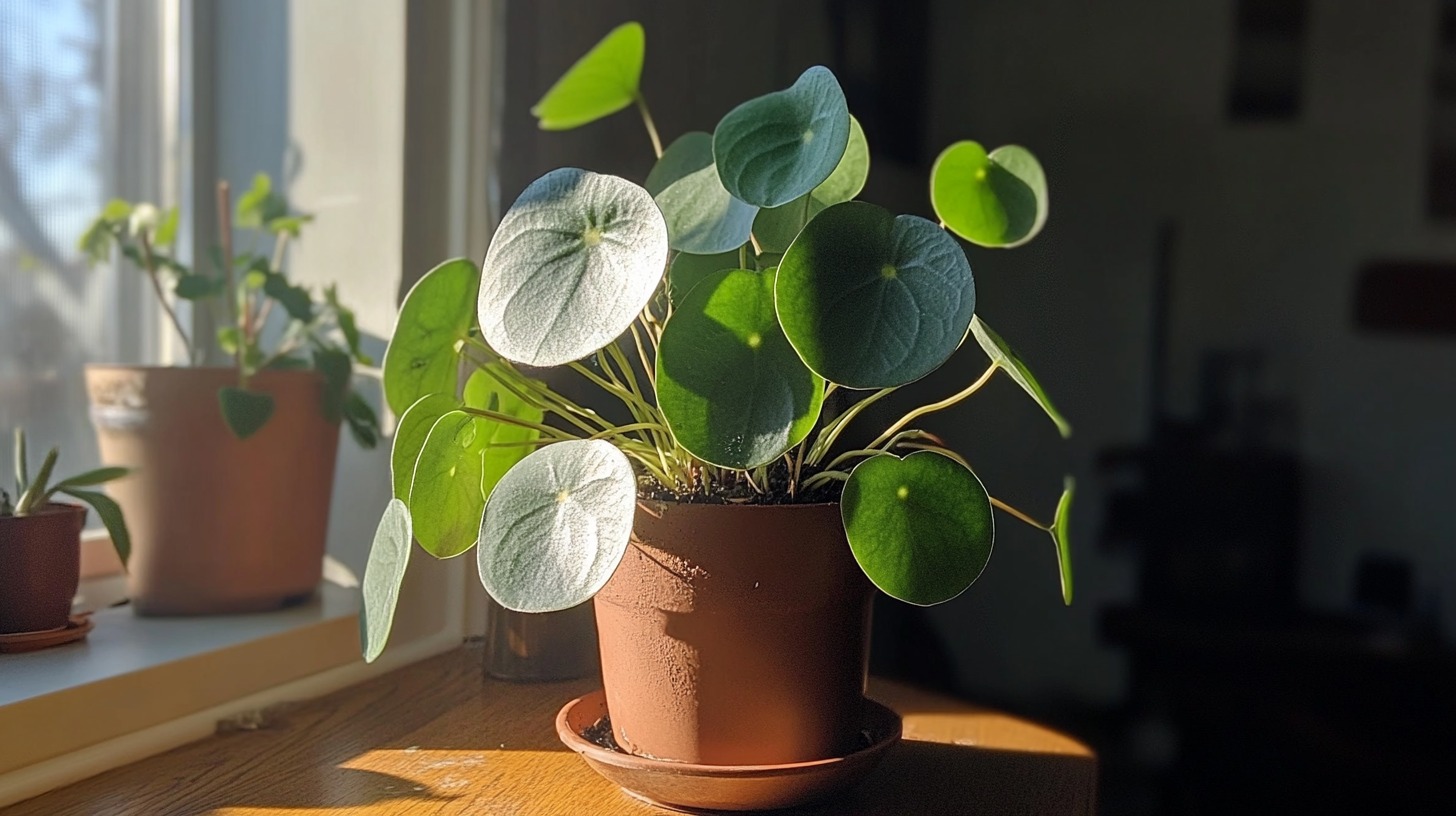
- Round, coin-like leaves
- Easy to propagate and care for
- Ideal for bright, indirect light
The Chinese Money Plant, also known as the UFO Plant or Pilea Peperomioides, is a beloved addition to many households thanks to its unique, round, pancake-shaped leaves that strikingly resemble coins.
These charming leaves grow on long, slender stems, creating a beautiful contrast that adds a touch of elegance to any indoor space. Its coin-like foliage is not only visually appealing but is also believed to attract wealth and good fortune.
One of the best features of the Chinese Money Plant is its ability to propagate effortlessly. It frequently produces small offshoots, known as “pups,” which can be easily separated and replanted, allowing you to share its positive energy and good luck with friends and family.
The natural tendency to multiply symbolizes prosperity and abundance, fitting perfectly with its reputation as a money plant.
5. Lucky Bamboo (Dracaena Sanderiana)
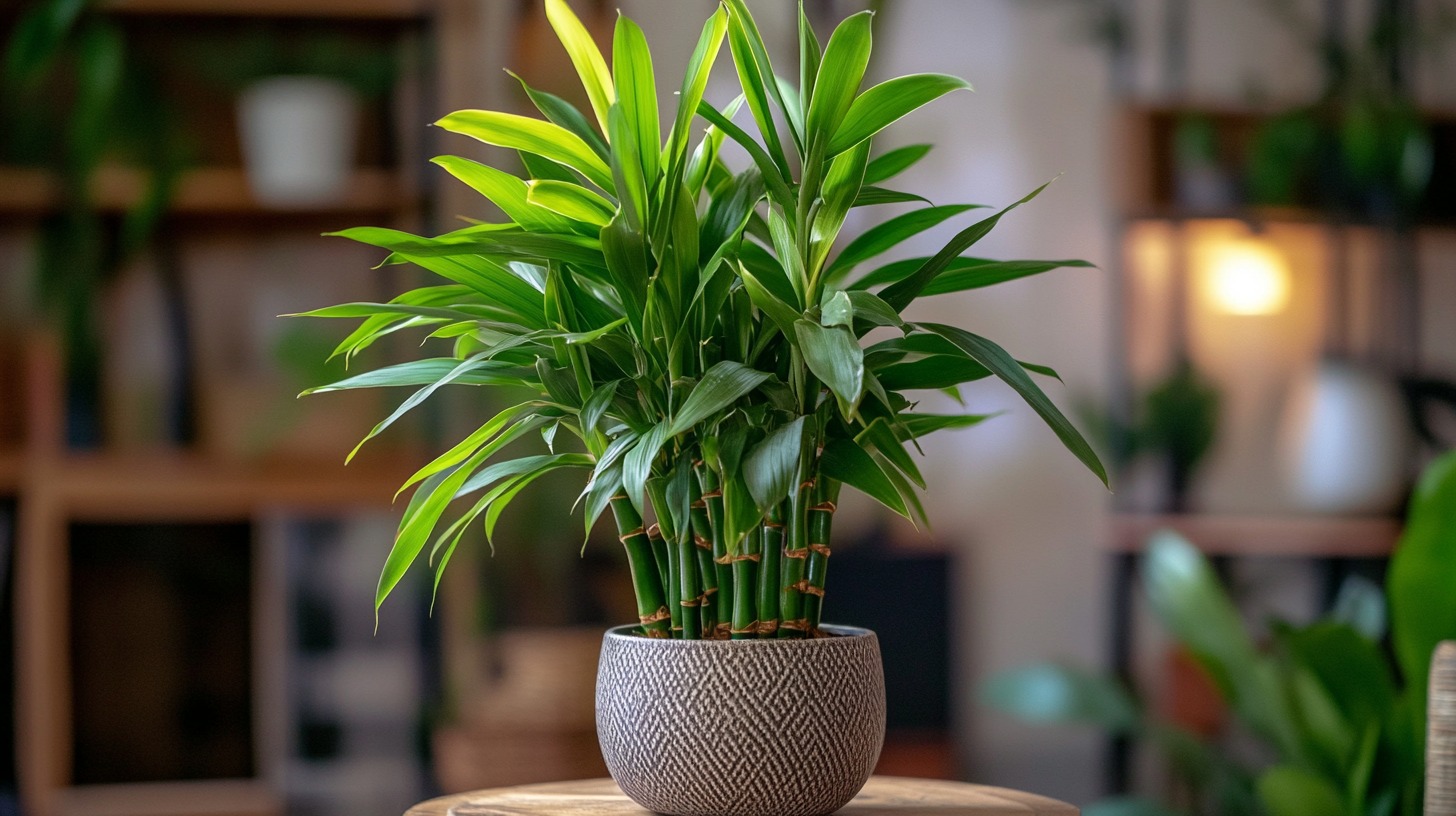
- Can grow in water or soil
- Attracts good fortune according to Feng Shui
- Minimalist and elegant aesthetic
Lucky Bamboo has long been associated with the principles of Feng Shui, which is believed to attract good luck, prosperity, and positive energy to any space.
The plant is not only a symbol of wealth but also represents balance, harmony, and resilience.
Its ability to thrive in both water and soil gives it versatility, allowing it to adapt seamlessly to different environments, whether in a vase on your office desk or potted in a corner of your living room.
One of the most intriguing aspects of Lucky Bamboo is the significance of its stalks. The number of stalks determines the kind of energy the plant brings into a space.
For instance, three stalks are believed to symbolize happiness, wealth, and long life, while five stalks promote health, and eight stalks bring growth and abundance. A cluster of nine stalks is considered the most auspicious, representing great luck and prosperity.
6. Silver Dollar Vine (Lunaria Annua)
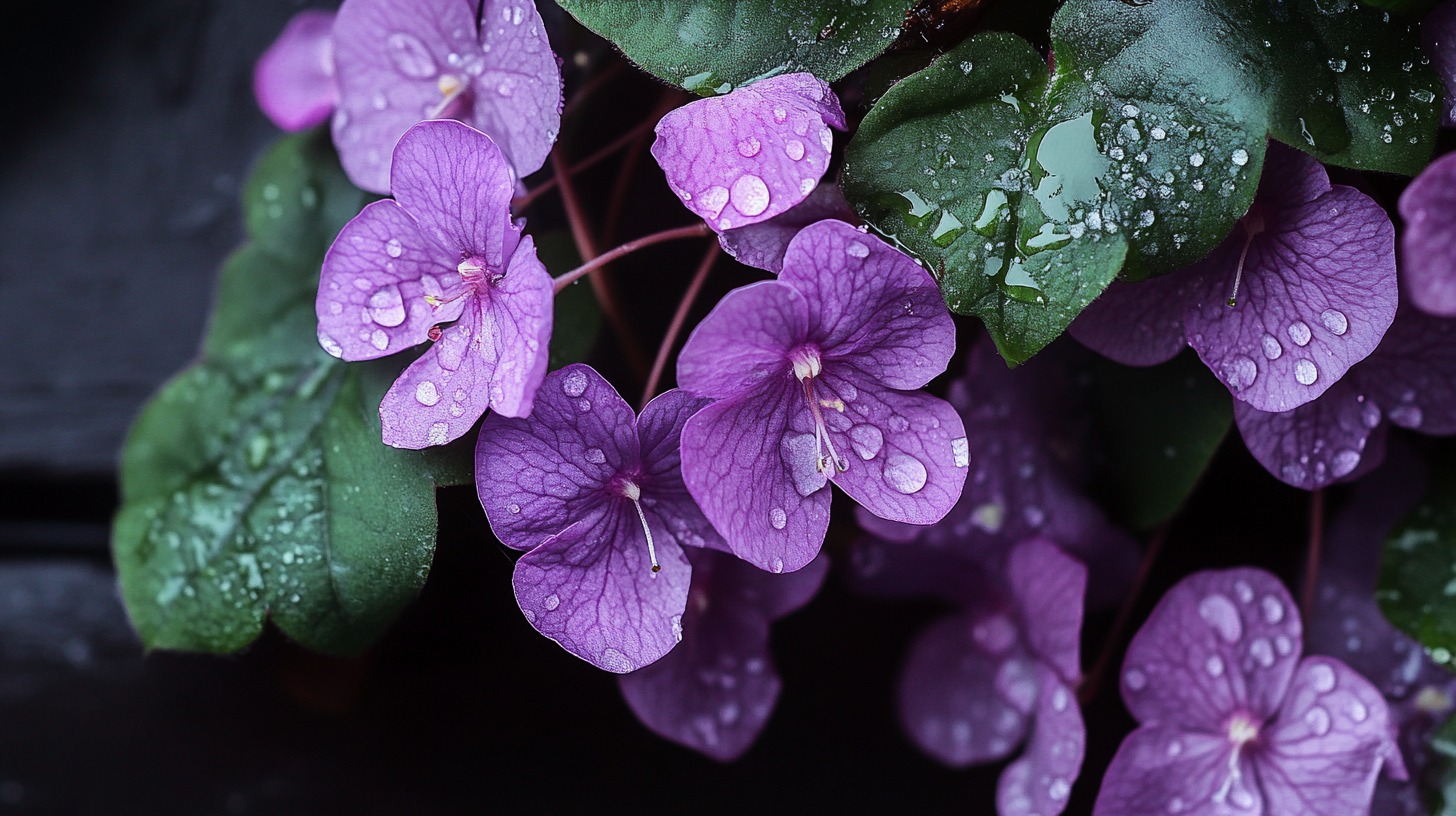
- Silvery, coin-shaped seed pods
- Adds ornamental value to arrangements
- Low-maintenance and easy to grow
The Silver Dollar Vine is renowned for its eye-catching, coin-like seed pods that shimmer in the light, making it a truly unique addition to any plant collection.
These round, silvery pods not only resemble coins but also symbolize prosperity and wealth, aligning perfectly with the principles of Feng Shui.
The plant’s striking, delicate appearance adds a sophisticated touch, whether used as a live plant in a pot or incorporated into dried floral arrangements to enhance interior decor.
Unlike more common money plants like Pothos or Jade, the Silver Dollar Vine stands out due to its distinctive appearance and ornamental value.
Its silvery sheen catches the light beautifully, adding a touch of elegance to spaces that could use a bit of brightness and texture.
7. Manjula Pothos (Epipremnum Aureum ‘Manjula’)
- Variegated leaves with creamy swirls
- Perfect for hanging baskets or as a tabletop plant
- Thrives in indirect light
The Manjula Pothos is truly a showstopper among houseplants, thanks to its strikingly beautiful variegated leaves adorned with creamy white swirls that contrast against shades of green.
The coloration gives it an almost marble-like appearance, making it a favorite for plant enthusiasts looking to add a touch of elegance to their indoor spaces.
Its foliage has an eye-catching blend of colors that brings a sophisticated yet natural charm to any room.
The versatile plant is a trailing vine, making it perfect for hanging baskets where its cascading leaves can create a beautiful waterfall effect.
It also works wonderfully on shelves, where it can spill gracefully over the edges, or as a striking tabletop centerpiece that instantly draws the eye.
8. Neon Pothos
- Bright, neon-green leaves
- Fast-growing and easy to care for
- Suitable for low-light areas
The Neon Pothos is known for its vibrant neon-green leaves that brighten up any indoor space.
Its vivid foliage adds a lively touch to rooms, even in dimly lit corners.
This fast-growing, resilient plant thrives in both bright, indirect light, and low-light conditions.
Its hardy nature makes it ideal for beginners or those with busy schedules, as it can tolerate occasional neglect.
9. N’joy Pothos (Epipremnum Pinnatum ‘N’joy’)
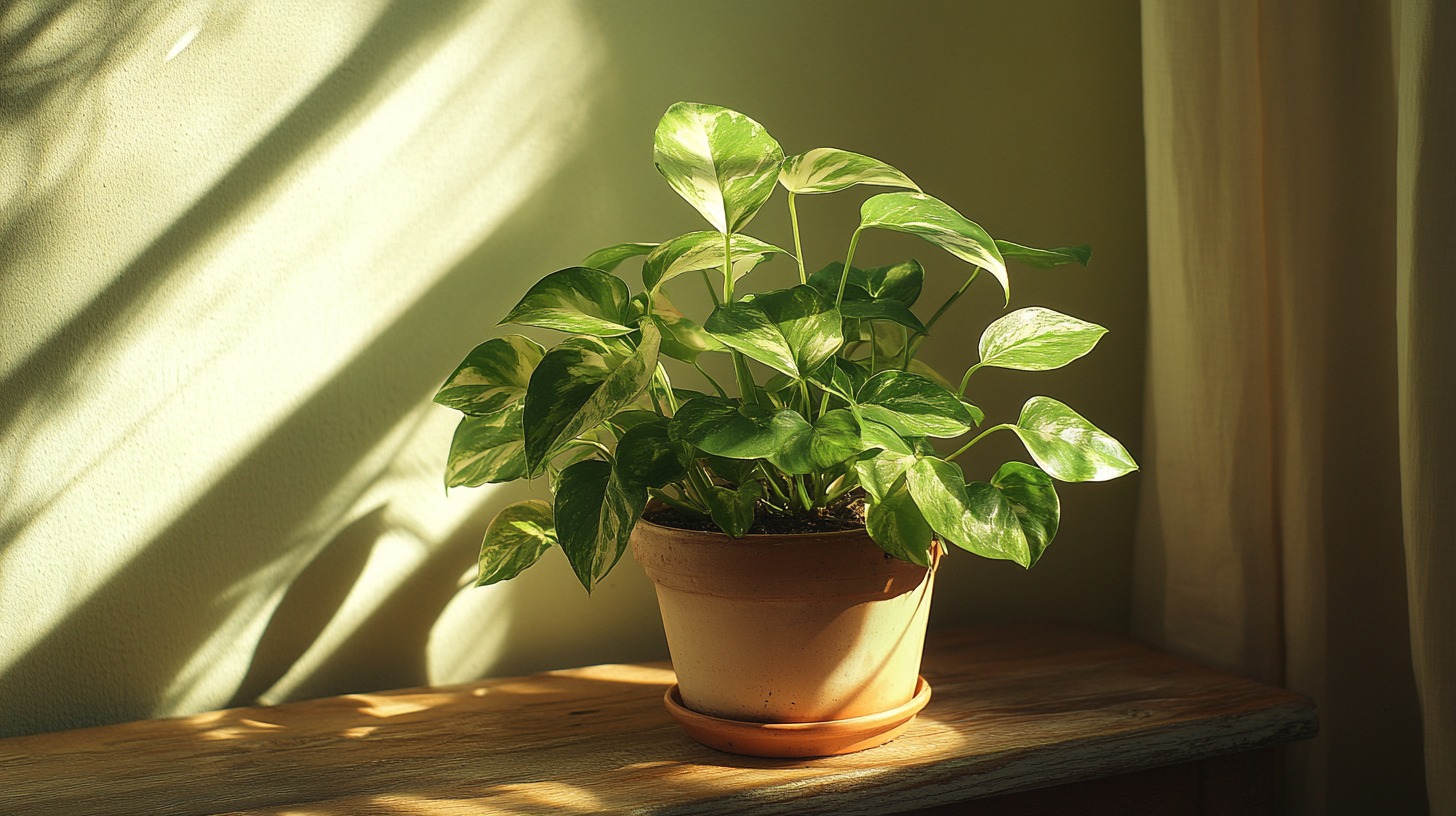
- Compact with green and white variegation
- Ideal for small spaces
- Low maintenance
The N’joy Pothos is a compact and eye-catching variety that stands out with its striking green and white variegated leaves.
Its delicate pattern on its foliage adds a touch of elegance, making it a popular choice for brightening up smaller spaces like bookshelves, desks, or windowsills.
Despite its refined and delicate appearance, the N’joy Pothos is surprisingly hardy and requires minimal upkeep.
It thrives in moderate, indirect light but can also adapt to low-light conditions, making it versatile for different indoor environments.
10. Spider Plant (Chlorophytum Comosum)
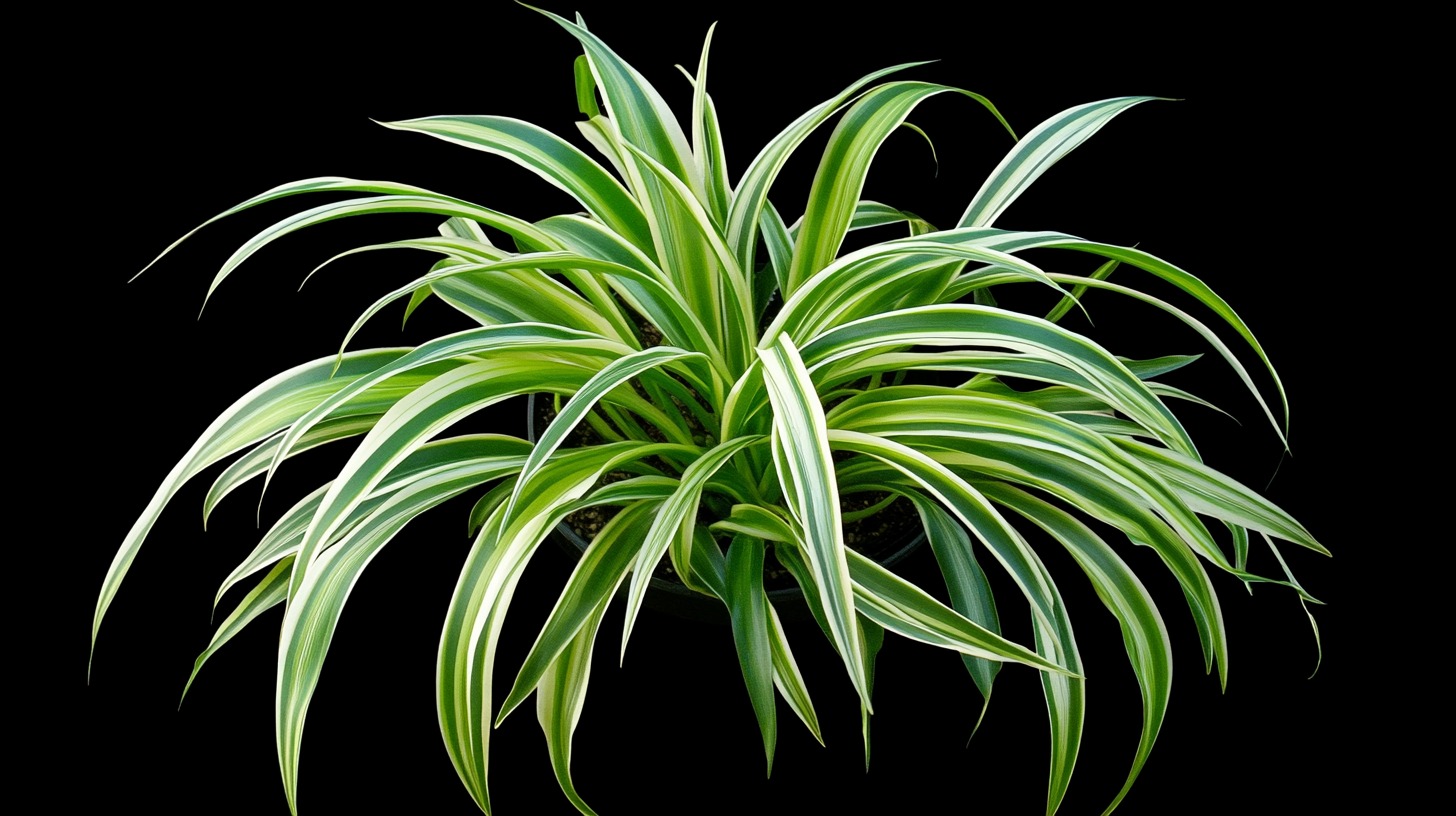
- Air-purifying with spider-like offshoots
- Easy to propagate
- Suitable for indirect light
Spider Plants are beloved for their exceptional air-purifying qualities, which make them a popular choice for enhancing indoor air quality.
Their distinctive spider-like offshoots, known as “pups” or “spiderettes,” dangle gracefully from the mother plant, creating a cascading effect that adds a touch of elegance to any room.
These offshoots can easily be propagated by simply cutting them off and placing them in water or soil, allowing new roots to form.
One of the greatest advantages of the Spider Plant is its low-maintenance nature.
It thrives in indirect sunlight and can tolerate a range of lighting conditions, from bright rooms to partially shaded corners. It only requires occasional watering, making it resilient to neglect.
11. Swiss Cheese Plant (Monstera Deliciosa)

- Large, fenestrated leaves
- Adds a tropical vibe
- Requires bright, indirect light
The Swiss Cheese Plant (Monstera Deliciosa) is known for its large, fenestrated leaves that resemble Swiss cheese. These leaves allow it to capture light efficiently.
Thriving in bright, indirect light, it can grow up to 8 feet indoors with proper care, making it an ideal statement piece for filling empty spaces and adding a touch of greenery.
12. Rubber Plant (Ficus Elastica)
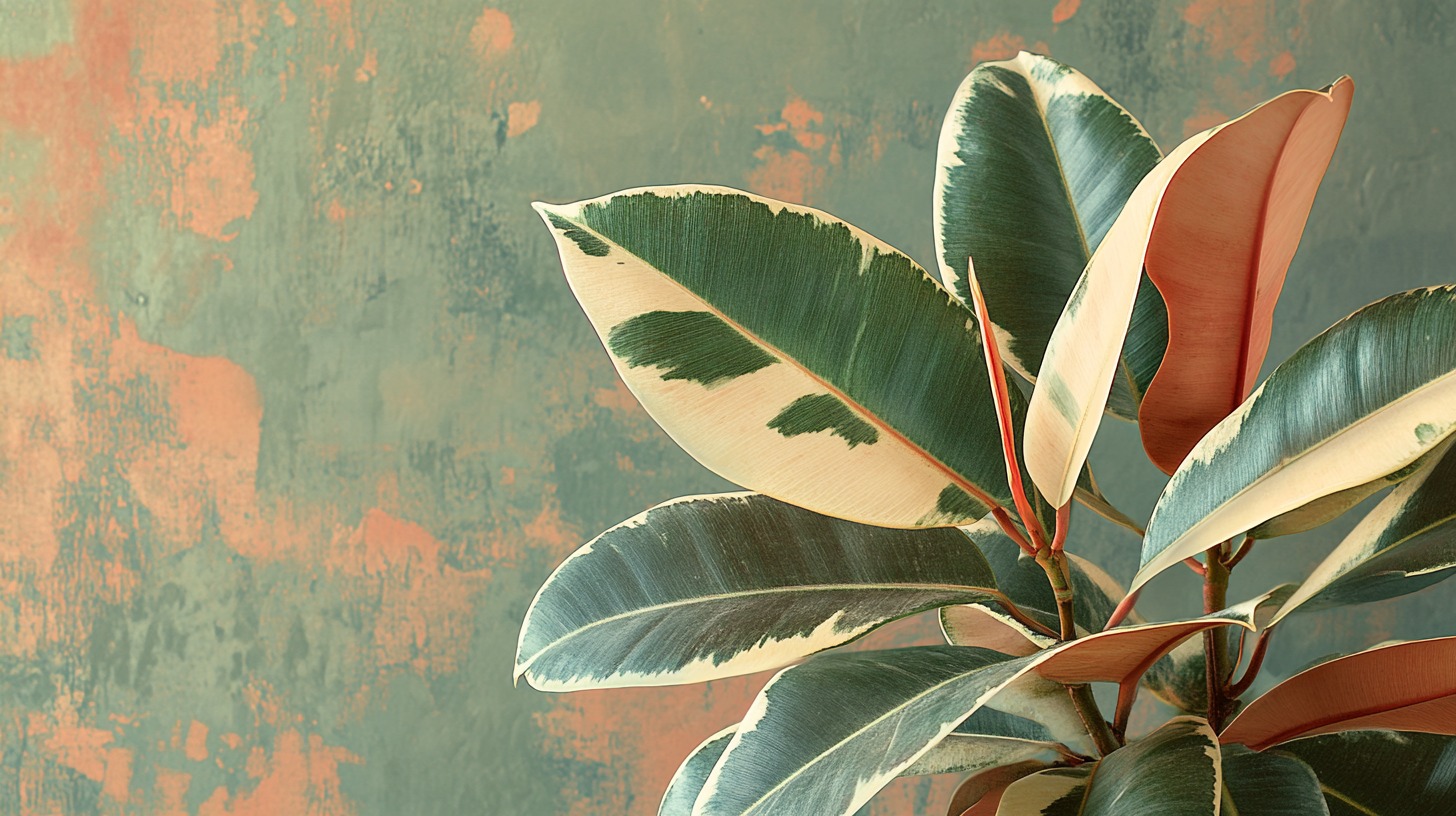
- Large, glossy leaves
- Symbolizes abundance
- Can grow tall and striking
Rubber Plants are striking houseplants known for their large, glossy, deep-green leaves that instantly draw attention.
These plants are also renowned for their air-purifying qualities, helping to remove toxins and improve indoor air quality.
Rubber Plants are known for symbolizing abundance and prosperity, making them popular in homes and offices.
This plant can grow tall, reaching heights of 6-10 feet indoors with proper care. Its upright form adds a touch of elegance to any space.
13. Snow Queen Pothos
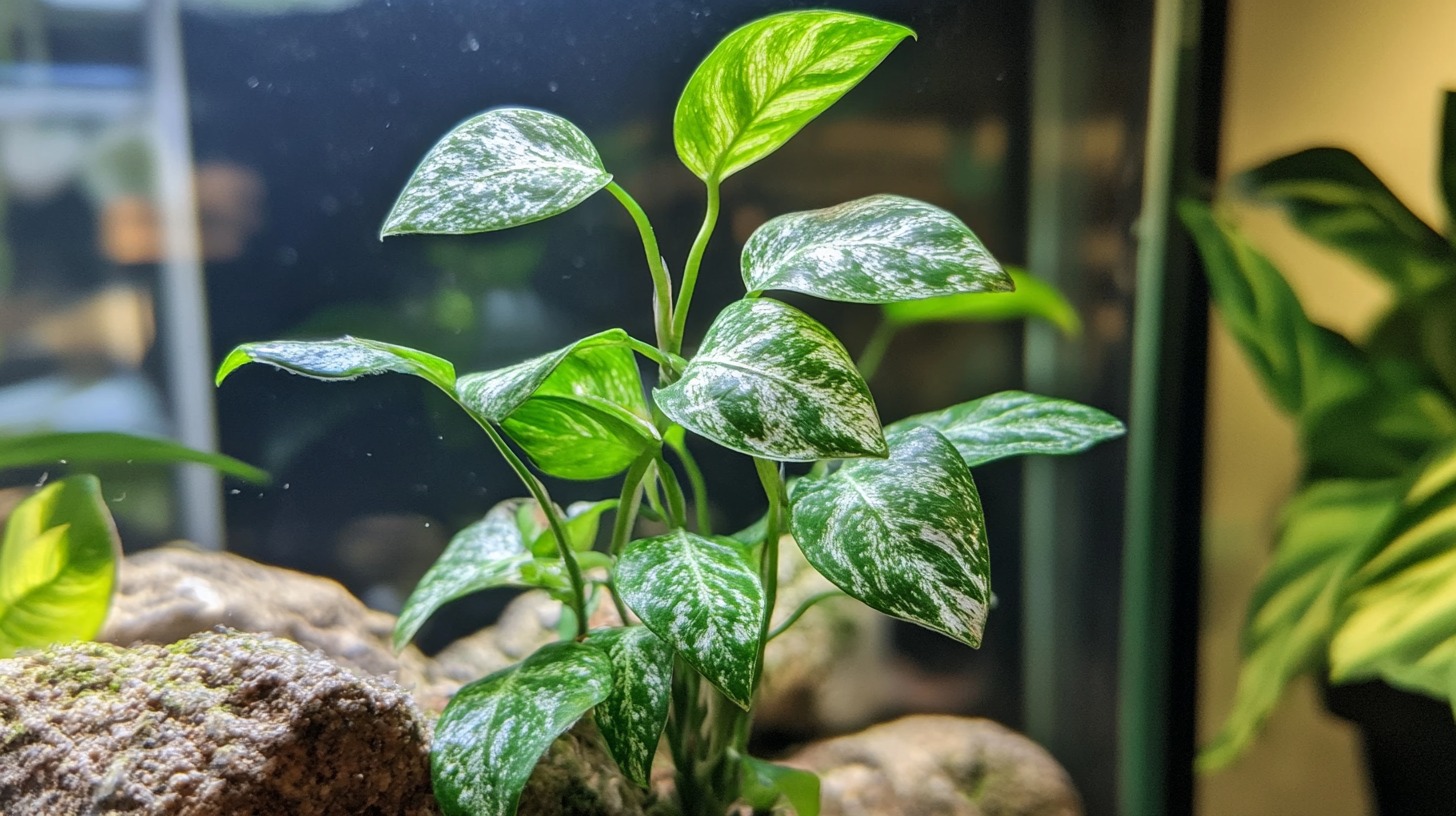
- White variegation for an elegant look
- Easy to maintain
- Thrives in various lighting conditions
The Snow Queen Pothos features striking white variegation with high contrast between deep green and creamy white leaves.
This resilient plant thrives in various lighting conditions, from low to bright indirect light, while maintaining its vibrant look.
It requires minimal care, with occasional watering and pruning to keep it full and healthy. Its adaptability makes it ideal for small spaces, offices, or hanging displays.
14. Cebu Blue Pothos (Epipremnum Pinnatum ‘Cebu Blue’)
- Blue-green, velvety leaves
- Great for trailing or climbing displays
- Low maintenance
The Cebu Blue Pothos is truly a standout among houseplants, thanks to its striking blue-green, velvety leaves that shimmer with a soft, metallic sheen under the right light.
Unlike other Pothos varieties, its elongated leaves offer a unique texture, adding visual interest to any plant collection. The distinct foliage makes it an excellent choice for those looking to add a touch of sophistication to their indoor greenery.
The Cebu Blue Pothos is a versatile plant that excels in both trailing and climbing displays, making it perfect for hanging baskets, shelves, or as a statement piece in vertical gardens.
As it grows, its vines gracefully cascade down or climb up a trellis, bringing a lush, tropical feel to any space.
15. Pennywort (Centella Asiatica)
- Coin-shaped leaves
- Can grow in water or soil
- Known for medicinal uses
Pennywort, also known as Centella Asiatica, is one of the money plants that offer both ornamental beauty and significant benefits in traditional medicine.
Its distinctive round, coin-shaped leaves symbolize wealth and prosperity, which makes it a popular choice as a money plant.
Many people associate Pennywort with good fortune, believing it attracts positive energy and financial stability when placed in homes or offices.
It is one of the money plants that is exceptionally adaptable, thriving equally well in water as it does in soil. It can grow in a simple glass jar of water, adding a touch of elegance to tabletops, or in a pot of soil, where it can spread lushly to create a vibrant green display
The Bottom Line
Money plants symbolize prosperity, wealth, and good fortune.
Placing them in areas like the southeast corner enhances their ability to attract financial success and positive energy.
Many of these plants also purify indoor air, promoting a healthier environment.

